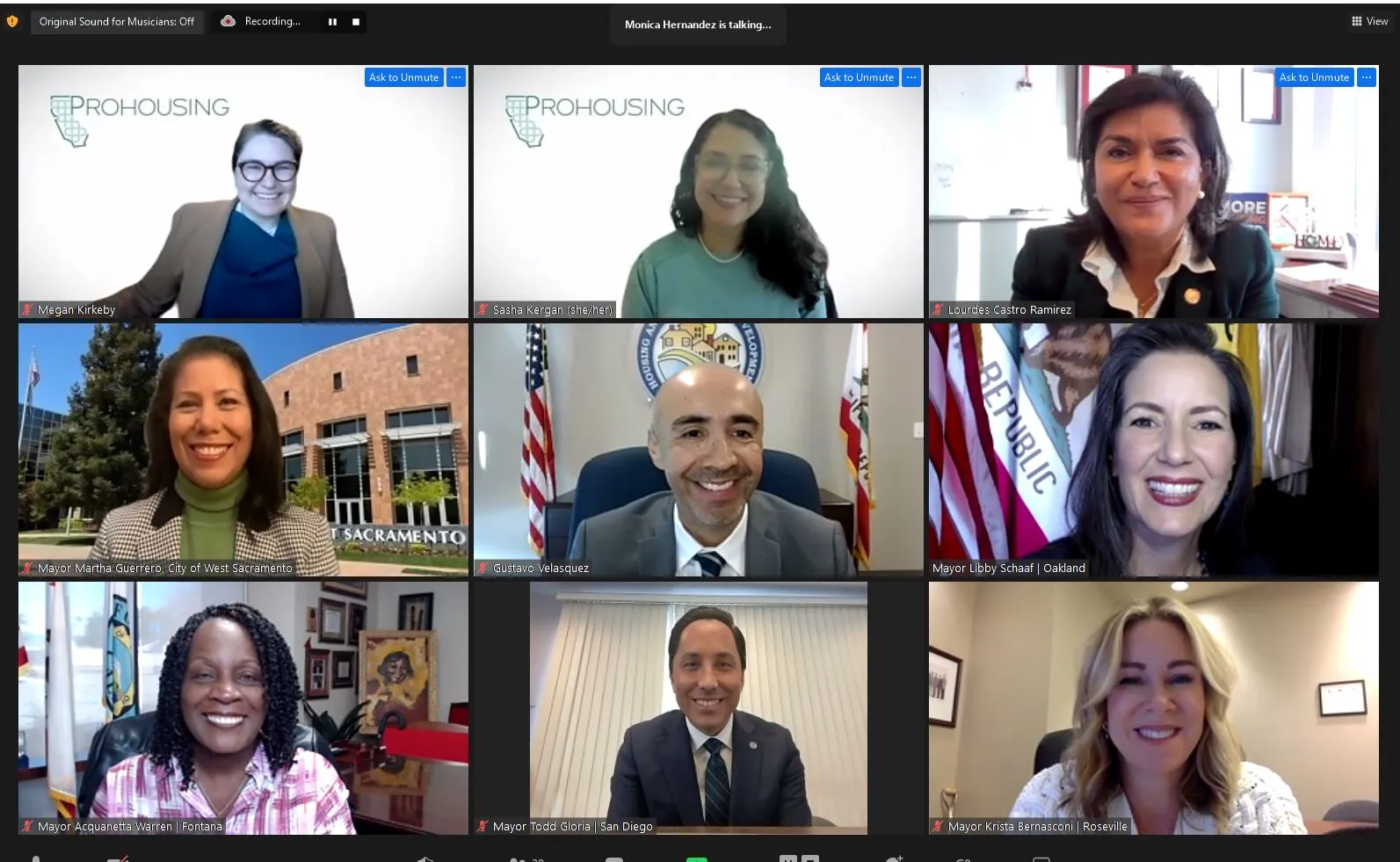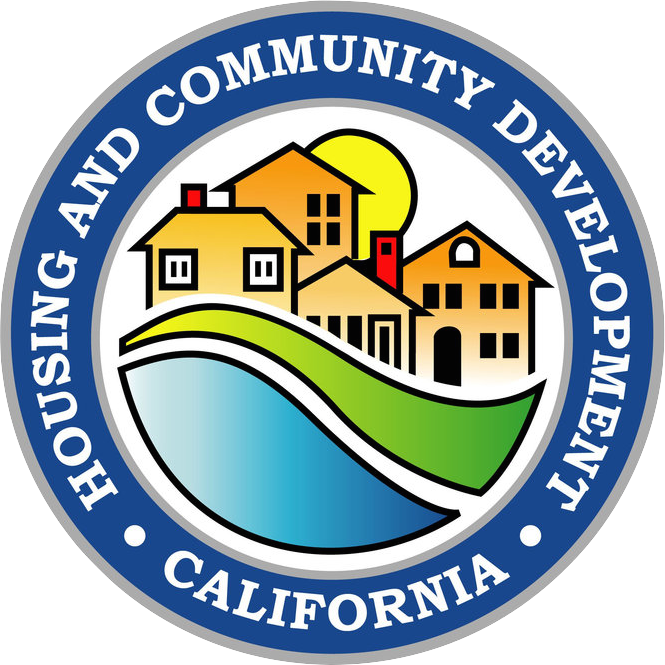Six California Cities Earn State Prohousing Designation
Seven Prohousing cities now eligible for additional resources through new grant program
December 15, 2022

Celebrating Prohousing Designation
Sacramento, CA
Today the California Department of Housing and Community Development (HCD) announced the cities of Citrus Heights, Fontana, Oakland, Roseville, San Diego, and West Sacramento have earned the state’s Prohousing Designation. These cities join the city of Sacramento in being recognized for committing to policies and practices that will help them remove barriers to housing production. HCD also announced the launch of the new Prohousing Incentive Pilot (PIP) Program to reward Prohousing cities working to address California’s housing crisis.
“These communities have stepped up to implement policies that aggressively eliminate bureaucratic obstacles and drive the growth of housing throughout the state,” said Governor Newsom. “This is one of many innovative approaches the state is taking to create greater accountability and reward municipalities willing to do their part to help collectively tackle the need for more housing. This is the right approach and I look forward to seeing more communities join in this effort.”
Governor Gavin Newsom’s fiscal year 2019-2020 budget established the Prohousing Designation Program as part of a spectrum of support, incentives, and accountability measures to help meet California’s housing goals. Increasing the availability of housing statewide is critical to bettering the quality of life of all Californians and to ending homelessness. The Prohousing designation provides incentives to cities and counties in the form of additional points and/or other preference in the scoring of competitive housing, community development, and infrastructure funding programs administered by HCD.
Cities with a Prohousing Designation are now also eligible for community development resources through the new PIP Program. The competitive program offers $25.7 million in additional funding to Prohousing cities to help accelerate housing production and preservation.
“Creating a healthy housing market that offers stability and opportunity is possible with engagement across all levels of government,” said Housing Secretary Lourdes Castro Ramírez with Business, Consumer Services and Housing Agency. “California is proud to partner with San Diego, Oakland, Citrus Heights, Fontana, Roseville, West Sacramento and Sacramento to create the right mix of housing near jobs and transit, health care, and key amenities. Incentivizing housing and making it a priority will lead to reduction in poverty, income inequality, and enable teachers, mechanics, home health aides, grocers, nurses, and food prep workers to find a place to live within a reasonable commuting distance and improve their quality of life.”
Cities and counties that receive the designation must demonstrate they are promoting climate-smart housing in a variety of ways, including but not limited to: streamlining multifamily housing development, up-zoning in places near jobs and transit to reduce emissions, and creating more affordable homes in places that historically or currently exclude households earning lower incomes and households of color.
“Prohousing cities demonstrate they are ready and willing to be part of the statewide housing solution to getting at least 2.5 million new homes by 2030, by eliminating many of the barriers to building affordable housing near daily destinations,” HCD Director Gustavo Velasquez said. “As promised, the state is ready and willing to award grants to Prohousing cities with the new Prohousing Incentive Pilot Program, to help get smart planning over the finish line.”
The Prohousing Designation is awarded when a jurisdiction submits an application with local policies that reduce barriers to housing production. Jurisdictions must receive a minimum score of 30 on the application. Highlights of the actions taken by these cities to attain the Prohousing Designation include but are not limited to the following:
- Citrus Heights: Pre-approved/pre-permitted Accessory Dwelling Unit (ADU) program; promoting active modes of transportation in high traffic corridors; objective design standards and program-level Environmental Impact Report for redevelopment of the 100-acre Sunrise Mall with capacity for more than 1,000 new housing units.
- Fontana: Published project map showing all proposed and approved entitlements from the last three years with in-depth detail; provided specific plans with environmental documents that allow for streamlined California Environmental Quality Act (CEQA) review; significantly reduced impact fees for infill development.
- Oakland: Neighborhood-level specific plans to streamline environmental review; a “one-stop shop” permitting approach to streamline across various city departments; investments in bicycle and pedestrian infrastructure; pre-approved ADU program.
- Roseville: Streamlined cross-departmental project approval/cost meetings; successful permanent supportive housing partnership between city and county; Housing Rehabilitation Program that provides 0% interest loans of up to $100,000 to low-income households for repairs needed for health and safety.
- San Diego: Updated community plans to provide zoned capacity in the city for more than 98,000 additional housing units, created Affordable ADU Bonus Program; waives density limitations and allows for a floor area ratio-based density bonus for development that provides affordable housing and infrastructure amenities. The City of San Diego has sufficient sites to accommodate 161% of their current 6th Cycle Regional Housing Needs Allocation (RHNA) total.
- West Sacramento: Incentives such as impact fee reductions, standards that allow for greater development intensity, and reduction of constraints such as parking.
The PIP Program is the first of many benefits designed to encourage local policy changes necessary to developing housing for all Californians. Applications for the PIP Program are due by March 15, 2023. Jurisdictions that have not received a designation but are interested in becoming Prohousing and applying for PIP can submit both applications.
For more information on HCD’s Prohousing Designation and Prohousing Incentive Pilot Program, please visit www.hcd.ca.gov.
What the Mayors are saying:
“Fontana is focused on creating a future that is more equitable, sustainable, and more resilient than ever. Real solutions require a higher level of collaboration and support than ever. This designation represents another critical tool in our arsenal to tackle the far-reaching issue of affordable housing,” said Fontana Mayor Acquanetta Warren.
“For more than two decades, Roseville has effectively set the stage for the development of a wide range of housing choices. Workforce housing provides more opportunities for people who work in the community to live in the community. There’s real value in that,” said Roseville Mayor Krista Bernasconi.
“I’m proud to see Sacramento recognized for being a state leader when it comes to eliminating the barriers to building the affordable, transit-friendly housing we so desperately need in our city and all over the state,” said Sacramento Mayor Darrell Steinberg after receiving the designation in February. “This designation signals to the development community that we stand ready to work with you and find creative ways to house more people.”
“West Sacramento is proud to be recognized by HCD as a Prohousing City," said City of West Sacramento Mayor Martha Guerrero. "We will continue to push the envelope with forward-thinking policies to help bring affordable, transit-served housing options to those in our community who most desperately need it.”
“Housing is the solution to homelessness, a key strategy for climate action and a path to economic opportunity for all – and we’re doing everything we can at the City of San Diego to build more homes at prices our residents can afford. I want to thank the State of California for validating the hard work we’ve done in San Diego to be a state leader in expanding housing opportunities near transit and high opportunity areas like job centers and college campuses. By passing prohousing policies at the local level and leveraging new tools and funding provided by the Governor and the Legislature, we will continue to build more homes, so everyone has a stable place to live.” said San Diego Mayor Todd Gloria.
“As a redevelopment and infill opportunity city, Citrus Heights works diligently to clear obstacles and find creative solutions so we can continue growing,” said Citrus Heights Mayor Tim Schaefer. “We have recently approved new single-family home neighborhoods, permanent supportive housing, and affordable senior projects that will collectively result in over 400 new homes between 2021 and 2023. Our recently approved Specific Plan to redevelop the 100-acre Sunrise Mall includes entitlements for up to 2,200 multifamily residential units. The City of Citrus Heights is excited to be recognized as a Prohousing community by HCD and continue our commitment to proactively stewarding our future with policies that build community.”

